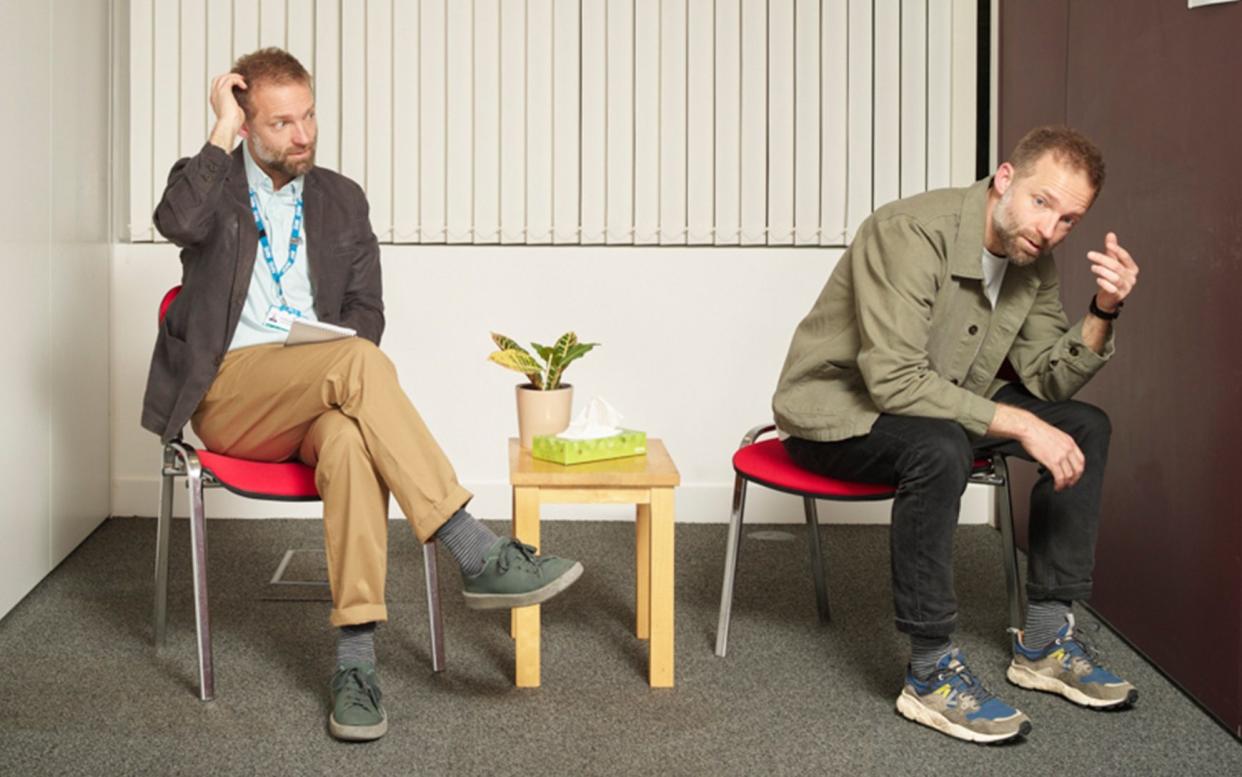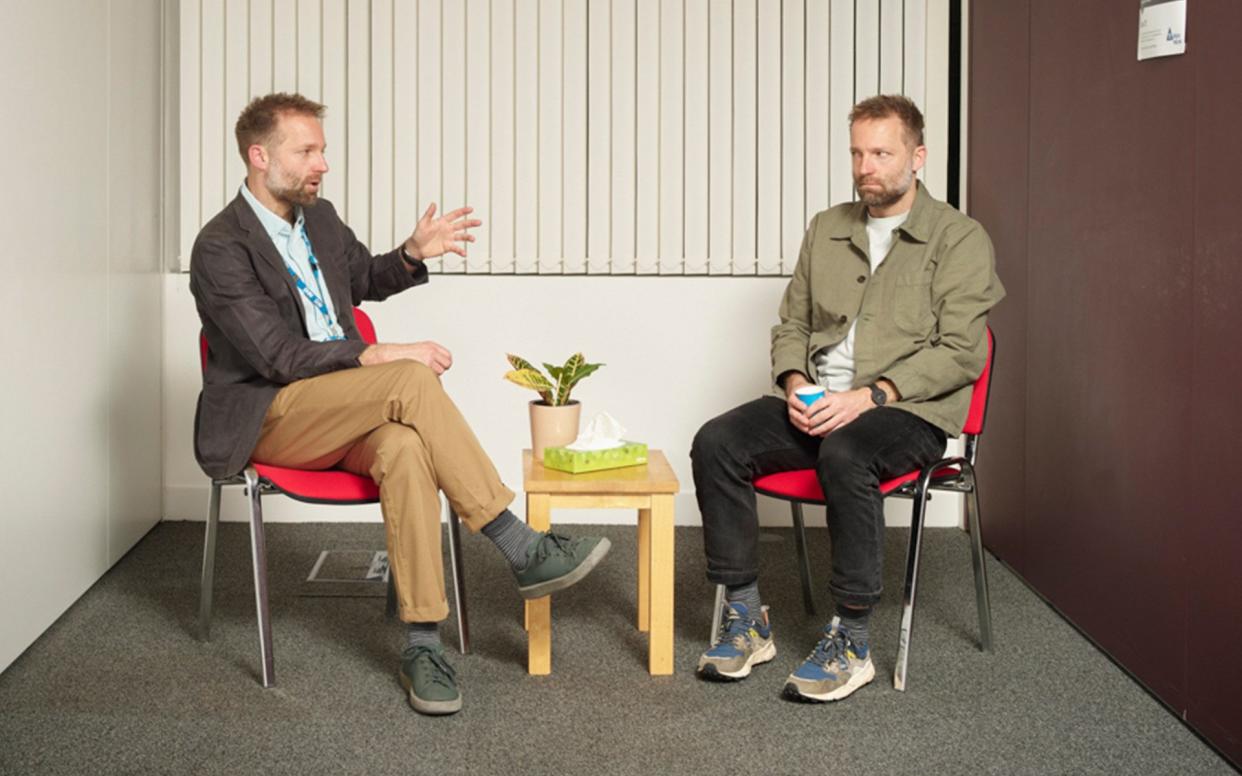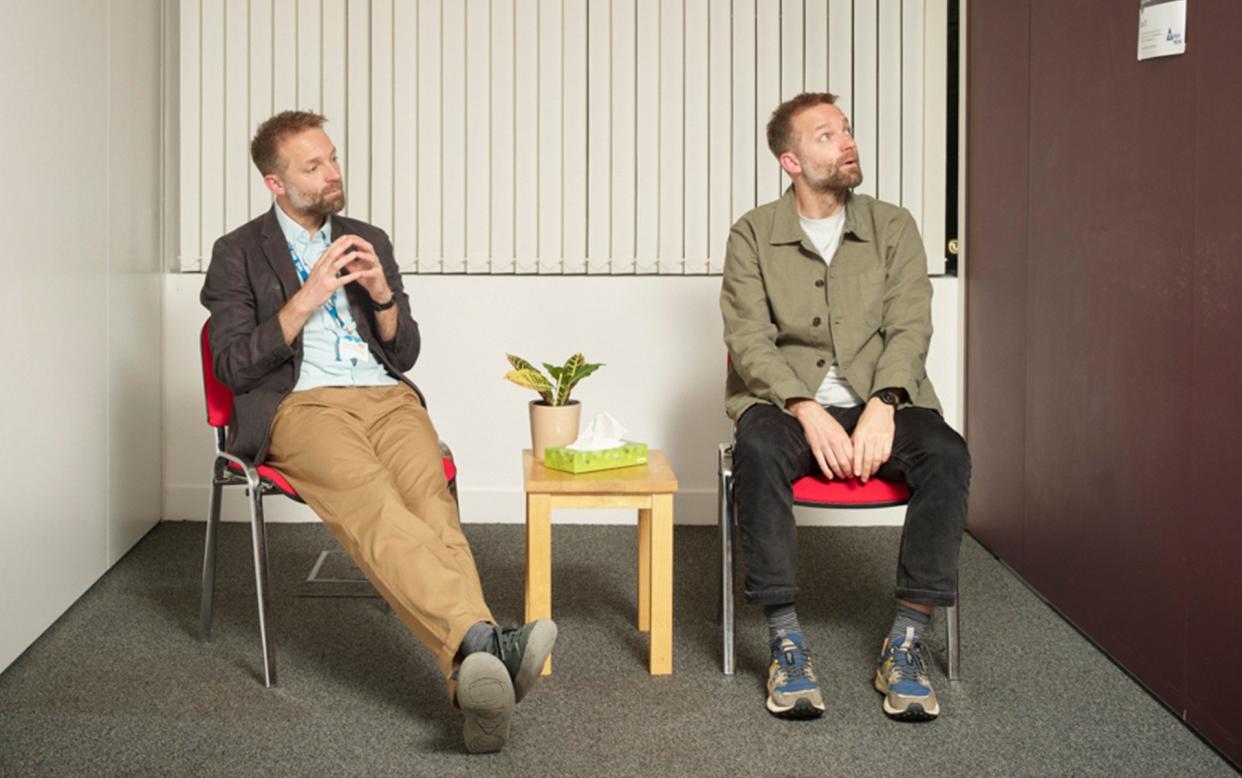My patient thinks he’s a werewolf: 10 years as an NHS psychiatrist

I was once on an aeroplane when the call went out about a medical emergency. It being the only time since leaving medical school that this had actually happened, I wasn’t going to miss my chance to shine.
‘Let me through, I’m a doctor,’ I said, elbowing my way past a gathering crowd, feeling like a hero in a film. A pink-faced good Samaritan with steamed-up glasses, already doing CPR on a body in the aisle, looked me up and down and asked: ‘What type of doctor?’
This was clearly a more competitive gig than I’d anticipated. I told him I was a psychiatrist.
He raised an eyebrow, turned back to the figure and muttered, ‘Well, I’m an emergency physician, yeah, so maybe if I manage to restart his heart then you can ask him about his childhood.’
Admittedly in this particular case, re-establishing a pulse was a solid starting point. However, this incident reflects a widely held sentiment still prevalent today, that mental health is less important than physical health.
There has been a welcome shift in public awareness through newspapers, radio, television, podcasts and TikTok. But the focus tends to be at the milder, more palatable end of the spectrum. Things like anxiety, depression, obsessive-compulsive disorder (OCD), autistic spectrum disorder (ASD) or the increasingly diagnosed attention-deficit hyperactivity disorder (ADHD).
Those with chronic, severe labels deemed messier, uglier or outright feared – such as schizophrenia or bipolar, personality disorders or substance-misuse disorders – receive less attention. The ones for whom some cold-water swimming and mindful colouring-in probably won’t cut it.
Do you know the difference between a psychiatrist, a psychologist and a psychic? Because of television, most people presume I’m either mind-reading (that’s a psychic), pitting myself against cannibalistic serial killers (that’s a forensic psychiatrist), or asking wealthy neurotics strewn on couches about their mothers (that’s a psychoanalyst).
Psychiatrists are medical doctors who specialise in the diagnosis and treatment of mental illnesses and can prescribe medications (and boy, do they). Psychologists help people usually with milder problems who are well enough to engage in talking therapies like CBT. And psychics mind-read and predict the future, like Mystic Meg. Psychoanalysis is the classic Freudian image of a patient talking about their dreams and childhood with a cardigan-wearing analyst sitting cross-legged, listening out for revealing slips of the tongue. Like when you say one thing but you mean your mother.
But as a general adult psychiatrist I spend my days helping, or at least trying to help, predominantly those with serious mental illness.
‘Modern-day torture house’ – five stars

It’s often said that mental illness is no different to a broken leg. After spending six years at medical school, I spent two foundation years as a junior doctor. During that time I treated many broken legs, mostly in A&E, and quite often in its corridors.
Back then I could see the problem either as a wonky deformity, or if I was lucky there’d be a diagnostically useful bone sticking out. When performing a physical examination, I could feel the break in my hands (although the patient might prefer me not to). If I was still unsure of the diagnosis, I could perform blood tests to rule out other serious causes of bone pain, like osteomyelitis. Or I could order an X-ray which would confirm the injury for me right there in black and white. Effective treatment was available too; I’d refer them to orthopaedics who would fix the break with screws, slap a plaster cast on and the patient would be pole-vaulting again in no time.
But psychiatry is different. You can’t see delusional disorder, you can’t feel bipolar. There is no blood test for depression. No X-rays can reveal the jagged cracks of a person’s mental breakdown. You can’t hold a stethoscope to someone’s head and hear the voices.
Philosophically, then, where should we draw these arbitrary lines between what we call ‘normal’ and ‘disordered’, which change with time and place? Until the 1970s homosexuality was considered a mental illness that needed ‘curing’ with aversion therapy. And how should we treat people who venture outside our concept of normal? And is there really time to ponder this when someone who believes they’re Jesus is trying to walk on water in the local swimming baths?
Another complication is that unwell patients who are disconnected from reality often lack the insight that they’re unwell, so understandably won’t willingly engage with treatment. At least that bloke with a backwards-facing foot suspects something is amiss.
The final potential banana skin is practical. Statistically one in four of us will experience a mental health problem at some point, and while mental illness accounts for 28 per cent of the nation’s overall disease burden, it receives just 13 per cent of NHS funding, according to the Centre for Mental Health. In fact, despite increased demand for mental health support, because of deinstitutionalisation and, more recently, austerity, the number of psychiatric beds in England fell from 67,000 in 1988 to just 18,000 in 2019. Consequently, acute wards run at a monthly average of over 100 per cent, with full hospitals creating extra makeshift ‘beds’ on ward sofas, camp beds in utility rooms, seclusion rooms and even doctors’ offices. Sometimes patients are sent up to 300 miles away to the closest hospital bed. In 2019 it was revealed that psychiatric patients in England had travelled the equivalent of 22 times around the world in one year for ‘out of area’ beds – can you ever imagine us making someone on crutches do that?
It is in this context – a world far away from the calm Manhattan therapy room of Woody Allen movies – that I treat my patients.
‘For those who don’t know, Femi is a 45-year-old man with psychosis who believes he’s a werewolf,’ Reggie, the nurse in charge, tells us.
We’re on the hospital’s male psychiatric intensive care unit (PICU); because some minds need thorough care too. Hidden away in the bowels of the psychiatric hospital, it’s where florid mental illness at its most disturbed and dangerous is housed.
Myself and members of the emergency response team are huddled inside the staff office, which is like the viewing platform in an aquarium, from which to observe tropical fish on the other side. There’s the usual din of a psych ward: occasional shouting and screaming, piercing alarms, the relentless banging and clanging of magnetic doors. And here the previous trainee told me that these patients hit the glass harder, or fly-kick the door to get your attention.
Last night he gave me a frank handover on the phone: ‘You think you’ve seen madness, and then you work on a PICU,’ he said. ‘The patients there are so unwell they generally have zero insight about their illnesses. So they’re all on sections, and because you often have to get medication into them through force, they hate you. But apart from that it’s not a bad job.’

After hanging up, I put my new workplace address into Google Maps. The hospital was only a 30-minute cycle away, but then I noticed its Google review score of 1.3. Unsurprising really, given that the reviewers generally don’t think they’re unwell so understandably resent being locked up and forced to take medicines. This does shine through in some reviews.
Darren wrote: ‘Modern-day torture house, evil staff, dangerous and highly ineffective treatments,’ but curiously awarded it the full five stars.
There were other serious, specific allegations. Kwame wrote: ‘These human rights abusers locked me up for six months and injected me with their poisonous medicines.’ Underneath the hospital had responded: ‘We are sorry our service did not meet your expectations.’
Kaleb seemed more easily pleased: ‘My mother nearly died here. Free onsite parking.’
In the staff office, Reggie continues briefing us: ‘Femi went into seclusion yesterday after he attacked a nurse unprovoked, hospitalising them with a human bite. We’ll go in and offer him some food, not the vegetarian option, OK? Let’s not make that mistake again. We’ll try and give meds and get clinical observations and an ECG. Then the new doctor will talk to him,’ he says looking in my direction.
I quickly scour Femi’s notes. He was admitted after neighbours complained of ‘persistent howling’ with his head out of the window. When doctors and police went to section him, he answered the door on all fours.
On admission it seems Femi was calm enough, besides some growling in between sentences. He’d allowed the ward doctor to do a physical (he was hirsute, it was noted – but not overly so). He also consented to bloods but became angry when he wasn’t allowed to drink the contents of the glass vials. He had leapt at the staff, gnashing his teeth centimetres from their jugulars, before sinking them into a nurse’s arm in the struggle, puncturing his flesh and finally satisfying his desire for blood. Like a drunk diving under the pump after being refused a pint.
Someone has already entered Femi’s diagnostic code – clinical lycanthropy – into the system. Before jumping to any conclusions, I would have liked to see what happens to the bitten nurse.
‘Oh, and he’s defecated on the floor,’ adds Reggie, which seems a strange afterthought.
‘Werewolf or not, we can’t tolerate biting ward staff’

We drag our feet down the corridor, getting suited into an armour of face masks, rubber gloves and tear-off aprons. Not my first choice of protective gear when going into battle with a werewolf. But I can’t deny, a small part of me is strangely excited. As we apply our plastic pinnies on the move, they flap at the back like the capes of NHS superheroes. No one’s sick of that yet.
A nurse is sitting by a robust, reinforced window. Video surveillance of the inside is transmitted to a computer monitor by her side. I peer at the CCTV screen, which shows a small, curled blob in the middle of the room highlighted against the bleached white floor.
‘Is that the…?’ I say.
The nurse nods.
‘How’s he been this morning?’ I ask.
‘He’s as good as gold when he’s asleep,’ she says with a tired smile.
I scan the seclusion pro forma beside her, completed in biro:
Time seclusion began: ‘2.35pm yesterday.’
Has the patient been informed of the decision to seclude? ‘Yes.’
Patient’s views on seclusion: ‘F—k you all, I will f—king kill all of you, f—k you.’
It seems counterintuitive to wake a man who has promised to slay us, to give him a medicine that might make him not want to do so. But rules are rules and he’s due a dose of medicine. Specifically, he’s overdue it, having stopped taking his antipsychotic months ago. Strangely, I already feel less conflicted in this environment since the need for intervention seems more clear-cut. In the usual grey world of psychiatry, here the spectrum between sane and the other one feels closer to black and white. It’s normal for us all to sometimes feel distractible, low, anxious, obsessive or paranoid, but even at pretentious dinner parties I don’t imagine anyone ever muses, ‘But aren’t we all sometimes a bit like werewolves?’
The philosophy in PICU is to treat patients ‘aggressively’, sometimes with whopping doses of antipsychotics even above recommended safe limits in the British National Formulary, the UK pharmaceutical reference book. But hitting the psychosis hard, just like blasting a cancer in chemotherapy, means doing the same to the patient. And unlike in cancer treatment, in PICU the patient has rarely agreed to it.
‘OK, left arm, right arm, left leg, right leg, waist, feet,’ Reggie says, assigning duties to his makeshift army. Everyone nods that they’re happy with the body part they’ll immobilise in the event of a scuffle. ‘I’ll take the head,’ Reggie says nobly, which given Femi’s biting history is surely the shortest of short straws.
Doctors are usually spared the physical work, partly in case it muddies the doctor-patient dynamic. Nurses have to try and establish a good therapeutic rapport and sometimes pin patients down, an impossible paradox, and unsurprisingly they bear the brunt of assaults on psychiatric wards.
‘Femi, we’ve got some things for you,’ Reggie utters through the intercom. ‘Sit on the mattress with your back against the wall please. That’s it.’
The reinforced door is swung open and the biggest nurses scurry in first like stormtroopers, with me at the back of the human shield. But no shots, fists, faeces or worse pelt us. Femi remains seated, perhaps still half asleep, his grubby bare feet hanging off the edge of the mattress.
Someone scoops up the poo into a bag with the casualness of a dog owner. Another removes his dinner tray, and someone else replaces it with a breakfast tray. These are the early peace offerings, hoping he’ll agree to our requests to monitor his physical health, to take medicine and to stop taking chunks out of the staff.
‘Good morning, Femi,’ I say, stepping forward like a cheery hotel manager just organising room service, momentarily pulling my mask down to reveal what I hope is a warm smile. ‘I’m Benjamin, one of the senior doctors. Nice to meet you. I’m sorry there are so many of us.’
‘You haven’t brought enough. I have the strength of a hundred men. The government legally classify my body as a dangerous weapon because I could tear you all to shreds. Would you like me to show you?’
‘No, I’m OK, thanks, Femi. I was actually hoping we could agree to do a bit less fighting,’ I say. Femi cocks his head back and howls. Then he uses his fingers to part his lips and show normal incisors, which he alleges are wolf fangs.
Given that challenging disturbed patients about their psychotic ideas is therapeutically fruitless and just antagonises them, some creative clinicians suggest tuning into a patient’s ‘psychotic wavelength’. Now seems as good a time as any to try.
‘I don’t think I’ve ever met a werewolf before. But werewolf or not, we can’t tolerate biting ward staff. Is that OK?’
‘Well, if you give me the food I eat.’
From the notes, I know Femi has solely been requesting raw meat. While NHS catering staff do try to accommodate most dietary requirements, he is having to make do with a paper plate of bacon and sausages.
‘Well, we’ve brought you a nice cooked breakfast, and that bacon looks a bit underdone,’ I say. ‘Would you let the nurses get your vital signs, temperature, oxygen saturation levels, things like that?’
‘Don’t worry – I’m immortal.’
‘Right, well, could we do it anyway? It’s kind of hospital policy.’
A nurse wheels the trolley over and hugs Femi’s arm with a blood-pressure cuff. Another puts an oxygen saturation probe on his finger and a third sticks a thermometer in his ear.
‘I’m a 5,000-year-old werewolf. My oxygen saturation levels are 100 per cent. My temperature is the same as molten lava,’ Femi says.
A student nurse whose job it is to write down the results looks at me and I shake my head.
Someone calls out from the glowing lime-green monitor: ‘BP 143/84. Heart rate 89. Resps 18. Temperature 37.1. Oxygen sats 100 per cent.’
‘Told you,’ says Femi. Then he leaps up and snarls. ‘Oh God, I can feel the beast coming on!’
The nurses hold their hands out, palms facing down to placate him. His eyes bulge from their orbits and I’m careful not to meet them, lowering my gaze to signal submission.
‘Femi, I think everyone would feel calmer if you sit down again. Also, it’s only the morning and I didn’t think werewolves came out during daylight hours.’
‘Is it?’ he says looking around the room, disorientated. He’s been awake most of the night and there are no windows in here.
‘Yeah, look, it’s only just after 8am,’ I say, showing him my watch.
‘Oh,’ he says, surprised. Then he sits back down again. The team and I collectively relax, and thank God that we’re not working the night shift.
‘When an elbow jabs you in the eye it’s hard to demur that you’re meant to be on the feet’

Now for the hard bit. ‘Thanks, Femi. Finally, we need to discuss your medicine. We’ve brought it in two forms, oral or an injection. It’s nicer for everyone if you just swallow the tablets. Which would you prefer?’ In psychiatry we pretend to respect autonomy, but the doctor’s medicine usually ends up in the patient’s bloodstream one way or another. Their only choice is how it gets there.
‘F—k you. I know it’s poison.’
Friction during such exchanges often waxes and wanes, invisible forces controlling the tension just as the moon that Femi howls at pulls the tides in and out again. Up and down it goes, along with our collective blood pressures, usually falling with sufficient patience and verbal de-escalation. The problem is when a wave becomes a tsunami.
‘It’s honestly not, Femi. It’s medicine to help you think more clearly. And if you don’t take the tablet I’m really sorry but we’ll have to do it the other way.’
The emergency response team steady their footing. Reggie pulls the cuffs of his blue gloves higher up his wrists.
Optimistically I offer Femi the paper cup of tablets. He eyes them closely before slapping them away, then he charges at us, jaw wide open.
In the struggle, Femi’s arms and legs thrash around. I once heard about a psychiatric patient who somehow covered himself in butter as medicine time approached so he’d be harder to restrain. Femi hasn’t gone so far as basting himself, but he’s still a match for 10 men, if not quite one hundred, who chase after their allotted limb, though some improvisation and exchanges occur. When a right elbow jabs you hard in the eye socket it’s hard to demur that you’re meant to be on the feet. After a prolonged tussle of people grabbing what they can, every part of Femi’s anatomy is pinned down by a different body, with me feebly standing above them, trying unsuccessfully to calm Femi with words. Next he’s flipped over and secured on the mattress.
Someone wriggles his trousers down, and two needles, one containing antipsychotic and another a rapid tranquilliser, are plunged into the gluteal muscle of his backside. Disturbing animalistic grunts and screams spray from his mouth. The bulging whites of his eyes tell the fear of someone who genuinely believes he’s being put down like a dog at the vet.
During such moments I can’t help wondering if psychiatric hospitals are actually good for people’s health. A ward patient once told me they weren’t suicidal until they were incarcerated in a psychiatric hospital. Another terrified inpatient once asked me quite sincerely, ‘Am I in hell?’
As Femi’s struggling slowly subsides and the tortuous noises become softer, I wonder what the alternatives are. Let severely disturbed patients eat the staff for breakfast? Uncoil the asylum chains and dust off the straitjackets? Seclusion, physical restraint and enforced medication aren’t a good arrangement, but are perhaps the least bad ones.
After roughly five minutes, the powerful, high-dose medicines have been carried from Femi’s buttocks through the bloodstream, until they marinate his brain. Everything goes floppy, from his tongue to his toes, and he sinks back on to the mattress.
‘I’m really sorry about that, Femi,’ I say and I mean it. ‘Maybe next time you could just swallow the tablets.’
A responsibility that weighs heavily on a psychiatrist’s shoulders is when to terminate a seclusion. A patient showing regret about earlier violence and giving assurances about future pacifism is probably safe to return to the main ward, a small degree of liberty restored. Lack of remorse, stated future threats or persistent psychotic symptoms relating to violence imply seclusion should continue.
‘Femi, do you feel bad about what happened to that nurse?’ His eyes are now sunken and lifeless. ‘No,’ he says groggily.
‘And hypothetically speaking, if you came back on to the ward now, would you just be looking to keep a low profile or—’
‘I’d kill everyone.’
Well, that’s that then.
At lunchtime I’m rooting around the communal kitchen looking for a teabag and some milk when a member of staff comes in. ‘Can I help you?’ she says in a tone that translates as what the hell do you think you’re doing?
‘Hi, yeah, I’m just trying to make a cup of tea before the afternoon ward round. Is it a help-yourself thing here or can I pay into a kitty?’
‘People have to bring their own. We used to have a kitty and everyone was supposed to put £1 in every month, but it was always the same people paying and the same people not paying.’ She looks at me and I know which category she’s putting me in. I think I’m more scared of this woman than I was of Femi.
I sometimes wonder why the NHS, as Europe’s biggest employer, which splashes out hundreds of thousands of pounds on a single course of some cancer drugs, couldn’t fork out for some milk, instant coffee and tea for its 1.3 million workforce. Those 1p teabags would surely pay for themselves through improved morale and productivity. And the time I’ll waste trying to hack that combination padlock.
She enters the numbers to unlock it, then opens a cupboard revealing tea, instant coffee and biscuits. She selects a teabag and I optimistically think it’s for me, until she puts it into a mug which has a huge ‘M’ on the front, prohibiting the other letters of the alphabet from using it. Then she closes the cupboard, locks the padlock and mixes up the numbers again.
‘May I?’ the woman asks, pouring the hot water I’ve just boiled. Then from the fridge she adds a glug of milk from a brand-new two-litre bottle already bearing her name. I just stand there dumbly holding an empty mug which is probably somebody else’s.
‘Oh sorry, I should have said. There’s a shop literally seven minutes away on the high street,’ she tells me.
‘Thanks,’ I say, knowing I need to begin the ward round imminently. ‘I’m Benjamin by the way, the new doctor.’
‘Margaret, head of hospital care,’ she says, starting to walk out of the kitchen. ‘I hope you enjoy working here, it’s a really nice team.’
To preserve the anonymity of patients and colleagues, names, places and identifiable details have been changed. Extracted from You Don’t Have To Be Mad To Work Here: A Psychiatrist’s Life, by Dr Benji Waterhouse, out 16 May (Vintage, £18.99); pre-order at books.telegraph.co.uk


